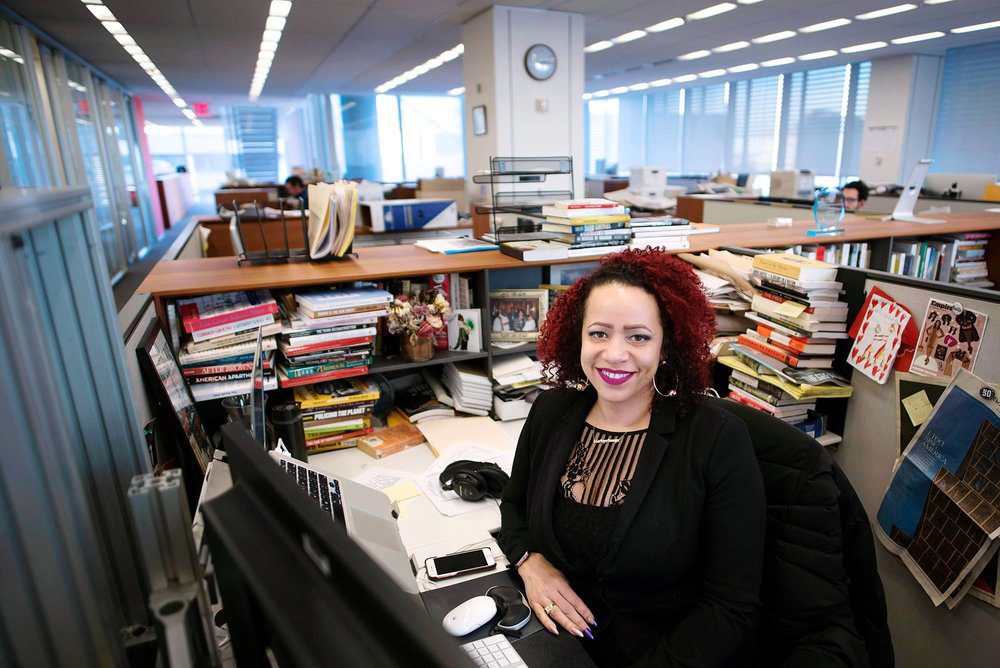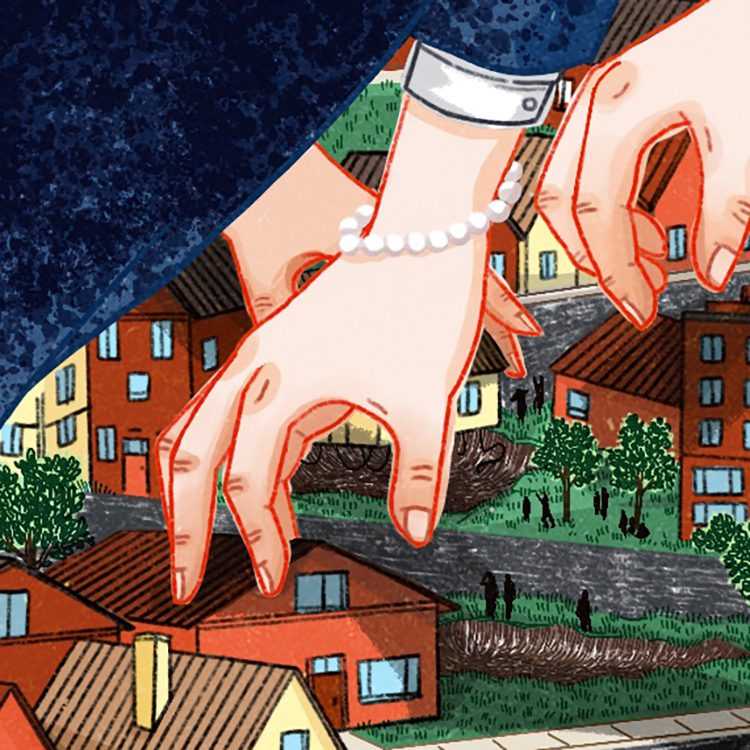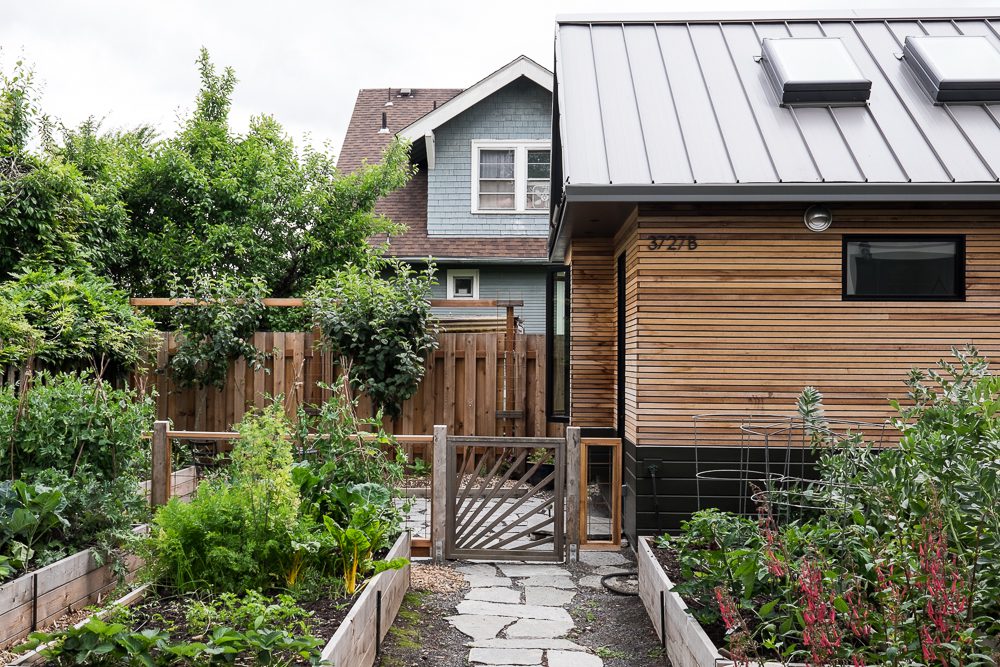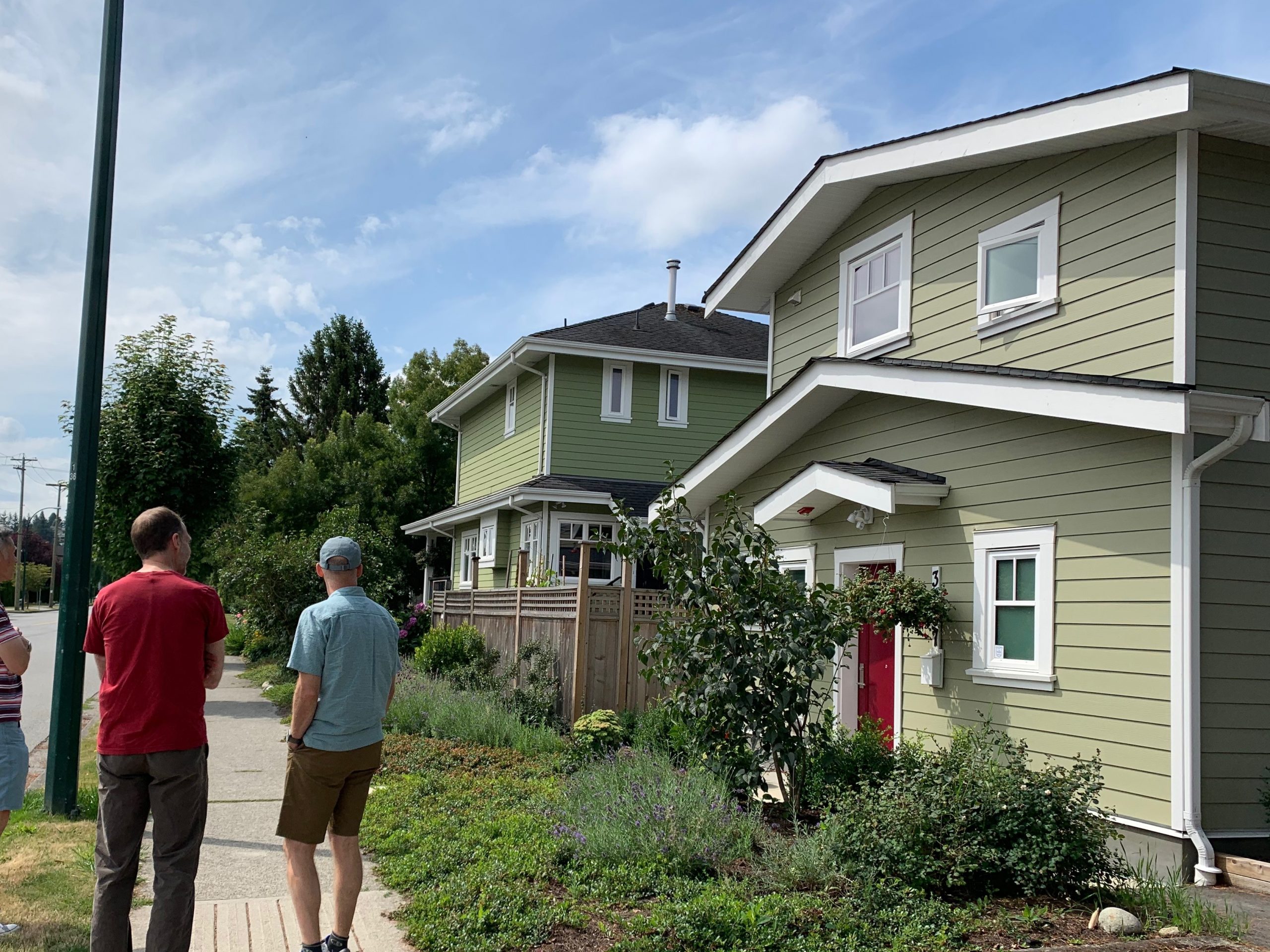
Nikole Hannah-Jones. Photo courtesy of Karsten Moran
Nikole Hannah-Jones is an award-winning investigative journalist who has used her writing to turn a bright light on in the room where we’d hidden away the unfinished work of housing and school desegregation. Hannah-Jones is a 2017 MacArthur Foundation fellow—also known as a “Genius Award” recipient. Shelterforce spoke with her about her research into the persistence of racial segregation, and how without government intervention, average Americans have done an excellent job of maintaining “separate but unequal” schools.
Miriam Axel-Lute: Recently you’ve been writing a lot about educational segregation, but we started following your work when you were writing about fair housing, and obviously, they’re very closely related. How might you suggest that folks who are building affordable housing think about where they’re putting it, through the lens of school integration?
Nikole Hannah-Jones: It’s tricky, because as my work has pointed out, housing segregation is responsible for a lot of school segregation, but is in some ways unrelated. The key culprit of school segregation I think is racism. It is clearly important to build integrative housing regardless of schools. It is important that poor and Black and Latino [people] are able to live in areas of opportunity. Housing that is integrated is always critical, but it’s not enough.
You can build housing in ways that integrate, and schools can still be very, very segregated. We’re seeing that, particularly in neighborhoods that are gentrifying, white families and middle-class families are moving into neighborhoods, but they’re not enrolling their children in schools. Housing will not solve the problem of school segregation.
For lower-income families that get the opportunity through affordable housing to move into high-opportunity neighborhoods, their children are going to get integration. But I’m thinking more about neighborhoods that are already segregated.
Keli Tianga: You’ve noted in interviews that the main key to access, whether educational or economic, for Black people is proximity to whiteness, because that’s where the resources are. Do you have an opinion on mixed-income housing’s supposed benefit [to] poor people—who are most likely going to be of color—being “close” to people with more education or wealth—who are most likely not going to be people of color?
Hannah-Jones: It’s very clear that concentrating poverty is toxic. It allows politicians and companies to write off certain neighborhoods and not meet the needs of those neighborhoods. So, of course, integration in terms of social class is extremely important because we’ve never provided the necessary resources for high-poverty communities. We almost always neglect those communities. We neglect the schools. We neglect the infrastructure.
When you look at some of the lawsuits filed by the Justice Department, and the settlements and studies that [had] to do with fair housing, it wasn’t necessarily that banks and insurers were targeting Black people because they were Black. They were targeting them because segregation made Black people easy targets. You could bank [un]fairly in entire swaths of communities because there was no other banking happening. Concentrating poverty just makes already-vulnerable communities even more vulnerable.
If you look at what the U.S. Census shows us, the typical poor white family is not living in concentrated poverty, [it] is actually living in a middle-class neighborhood, and their kids have access to middle-class schools. The inverse of that is that the typical middle-class black family is actually living in a higher-poverty neighborhood than a [typical] poor white family.
The typical experience of poor white families is what we as Americans should want for impoverished people in general: that their income is not locking them out of areas of opportunity [and] that people of different races and incomes are able to live in the same community and get the same benefits. That’s really critical, and I think we all know that cordoning off entire communities of people [in] poverty is never going to be a good thing.
Axel-Lute: Discussing the problems of segregation can slip from what you so clearly articulated into sometimes sounding like “groups of Black people living together is a bad thing.” Is there a way that we can talk about this that doesn’t feed that?
Nikole Hannah-Jones: It’s not about Black people can’t live around other Black people, it’s about we have a history and a country that was built on racial caste that has never valued Black people like it has white people, and certainly has not valued Black communities like it has white communities. That’s just a reality. If Black folks were allowed access to the same capital, if their concerns were treated the same by government, if they were not preyed upon by banks, then there would be no problem with all-Black communities.
The argument for proximity to whiteness is not that there’s something magical about white people. When I talk about [proximity] in schools and in housing, what it does is guarantee that Black folks get the same things that a country built on white supremacy guarantees for white Americans. That’s the only issue.
The reason my work is so deeply historical is [because] I am laying that foundation to show that it’s never been that Black folks were just simply left to their own devices to thrive like every other community—Black people have been systematically denied access to the same opportunities as white communities. You can look at the story about the Baltimore schools, where there’s children in classrooms with no heat. One cannot imagine that happening to a classroom full of white kids. You just can’t even picture it.
What that tells you is we have always been willing to accept certain circumstances for Black people that we would never accept for white people. I wish we had found another way where this country would simply value Black people the same, and Black people did not have to have proximity to white people to get these things, but it’s just simply not true. If that class has 15 or 20 percent white kids, those things don’t happen, and that’s just the reality. It’s uncomfortable and it’s painful, but it’s the reality.
[I’m] not saying that heaters or boilers never break in a white school, clearly. I’m not talking about exceptions, I’m talking about what is a common experience, and the fix is not immediate. This has not been just one day where something happens to go wrong, but that we are just willing to accept certain conditions.
Tianga: The knee-jerk response in those communities of color is, “This has been happening for years,” and the knee-jerk response in [white] communities is so swift to the other end that the school district is forced to respond to it because they can’t get any other work done.
Nikole Hannah-Jones: It’s also who we listen to. I’m fairly certain that poor Black parents in Baltimore were complaining about their kids being cold in school. Integration to me really is about power. Through my career, [I] have sat in countless school board meetings where poor parents, Black and Latino parents, will come and complain about conditions in a school, and they are dismissed. Their concerns are not taken seriously. They are not resolved.
In my own daughter’s school, there had been complaints about chaos in the lunchroom. It got so bad that I [spent] lunch with her, and after lunch immediately went and talked to the principal. Things got fixed right away. Other Black parents who live in the housing projects across the street from my daughter’s school, who are in that school all the time, were like, “We’ve been complaining about this lunchroom for months, and nothing happened. You come in one day, and it’s a problem that needs to be fixed.”
And so, then Black parents are conditioned, right? Poor Black parents are conditioned not to complain, because complaining is futile. And all of us would be like that. Think about any situation you’ve been in where you’ve complained to your boss about something, or you’ve complained to anyone. If those complaints go unanswered, you stop complaining. And then we blame those parents and say they don’t care.
Axel-Lute: Sheryl Cashin tried to make an argument [in her book Place, Not Race] that, at least when it comes to college admissions, race-based affirmative action integration is not really working anymore, that it’s leading to “optical diversity” without helping folks who really need it. She says elite institutions like Harvard have racial diversity with no class diversity at all, [and] suggests that we need to replace race-based affirmative action with place-based affirmative action. Basically, support all kids [from] segregated, poorly-performing school systems. That would be a way around this problem, and possibly be more palatable to the country at large. [What is] your reaction to that thought?
Nikole Hannah-Jones: I have mixed feelings on that. One, I’m weary of us trying to get around what’s palatable to white Americans. I think we need to talk about what’s right. We keep trying to find workarounds to racial affirmative action that will produce racial results, and it just doesn’t work that way.
I wrote about this a couple years ago, and what the research showed is [that] if you do simply economic affirmative action, a whole bunch of poor white kids are going to get in, and [the numbers of] Black kids and Latino kids are going to decline.
I don’t have a problem with that, but I think we need to confront the very explicit ways that race constrains opportunity independent of class. What we know is that if you are Black and middle-class, you’re still more likely to be living in poor neighborhoods. Your kids are still more likely to be going to schools where most of the kids are poor. I think that [the] typical Black American student goes to a school where about 67 to 70 percent of kids are poor, which is not the typical experience of a white student no matter what their income is. So it’s not just about class with Black people.
As we know, Black people can have income which would make them appear middle-class, but have no wealth. So when you’re looking at a place like Harvard, and you’re saying the kids who are getting in are middle-class Black kids, it’s relative. They’re not middle-class compared to the white kids who are getting in. And I would strongly disagree with the belief that those kids don’t need extra help, because they do.
We need to get more low-income kids of all races, and particularly Black and Latino, into those schools. So, if [class-based affirmative action] is something in addition to, I would be for that, but I don’t think it can simply replace it. Not to mention, affirmative action in general just isn’t helping that many Black and brown kids, let’s be honest.
Tianga: In Shelterforce, we’ve discussed the importance of having Black and brown people in leadership positions in community development and social justice organizations, the point being that people who are directly affected or have personal insight into certain community and social issues should be at the table when decisions are being made. Your Ida B. Wells Society for Investigative Reporting [a news trade organization whose mission is to increase the ranks, retention, and profile of reporters and editors of color in the field of investigative reporting] is founded on a similar principle.
On the issues of housing and school segregation, is there something comparable? Legal enforcement, as you’ve written for many years, hasn’t been effective. Is there a bottom-up solution that you have encountered where people are either trying to join school boards or real estate associations?
Nikole Hannah-Jones: There are certainly communities where people are trying at the grassroots level to address these issues. There are parent groups, there are community groups. And I do not want to sound dismissive at all, but my work is looking at a much higher systemic level. I’m not looking for what can work in an individual community, I’m looking at what systemically can change circumstances for Black kids.
I think far too often, we want to pat ourselves on the back for very small incremental changes, with the understanding that most Black kids are not going to receive an equal education. I’m not an activist. I think activists have to be very practical about what can be accomplished, and have to work in a much smaller realm. Grassroots organizing is critical. If you look at all the changes that came about as a result of the civil rights movement, they all started at the grassroots level, and they led to a bigger movement.
As a journalist, what I’ve tried to do with my work is show, yes, we have given up on enforcement, and we have given up on the courts, and I’m challenging that conventional wisdom that we should. I’m trying to force us back into a conversation at a national level. I’m trying to force us to challenge why we aren’t enforcing the laws on the book. Why aren’t we enforcing the Fair Housing Act? Why aren’t we enforcing Brown and the subsequent Supreme Court rulings? I think we should be.
If we are simply believing that school integration and school equality and residential integration is going to happen voluntarily, we have no reason in the 400-year history of what would become the United States to believe that that would happen. Integration and civil rights for black people have never come voluntarily. I’m not satisfied with us accepting that most Black kids will not get an equal education, [which] is not going to happen from incremental grassroots change.
Axel-Lute: I was struck by the parallel between the discussion in your article on where to send your daughter to school about redrawing the catchment areas for the neighborhood schools and Emily Badger’s recent piece about how property owners feel that they have a right to affect what goes on in their neighborhood. “We bought into this area expecting to go to these schools. You can’t change the lines on me” is very similar to “I bought into this area expecting that view.” Of course, the school thing is much more important.
Nikole Hannah-Jones: Right. And if you think about it, it’s not just individual homeowners, it’s real estate agents. It’s developers who can charge much more money for houses and apartments and land in areas that are zoned for certain schools. I wrote about this a little in the piece about my daughter, how Mayor DeBlasio [was] very protective of those interests.
Axel-Lute: Yes, that was striking.
Nikole Hannah-Jones: I believe that school boards [and] superintendents should have zero concern with property values. Zero. That is not their job. Their job is to provide a quality and equal education for all children. And the fact that so many of them would not make zoning changes for equity because they are worried about how people will respond to their property values I think is immoral. This is why people hated busing so much, because busing broke that link. You could not move into an area and be guaranteed access to certain schools.
[In] places where two-way busing was implemented, for instance, Mecklenburg County, [North Carolina], not only did school segregation decline dramatically, but residential segregation also declined dramatically when you could no longer buy into neighborhoods to get access to certain schools. That’s the same thing that you saw in Wake County in North Carolina, which has an extensive busing program that bus[es] both white and Black kids.
I think it is critical to unlink exclusive access to publicly funded schools based on whether you can afford to move into certain neighborhoods. What I tried to show in the piece I did about my daughter was the way we talk about who is deserving. “I deserve these schools because I worked hard to buy into this neighborhood,” except we know that people don’t have equal access, that there’s still a great deal of housing discrimination that keeps people out of these neighborhoods, that because of our long history of segregation and discrimination, Black communities, to a lesser extent Latino communities, don’t have access to wealth to buy into these neighborhoods.
So, it’s not simply a matter of who [is] deserving. It’s just one more way that systemic inequality benefits white Americans regardless of income. You can be a lower middle-class white person who has family wealth and buy into a neighborhood that someone like myself could not. That is why it is so important to unlink those two things.
Where the hypocrisy of that is most glaring is in a place like New York City, where starting in middle school, we have “district-wide choice,” and all of a sudden, you find that white people, when their neighborhood school is Black, they don’t want to send their kids to their neighborhood schools. They want to be liberated from their neighborhood school. They want to be able to send their kid wherever, and “wherever” means to a school where Black kids are not in the majority. It’s only when the neighborhood school is white that you find white parents arguing for neighborhood schools.
Axel-Lute: I’m located in Albany, New York, and I know that you will hear here that if we restrict the access of “parents with choices,” which means generally white parents, that they will leave the city because we don’t have a county-wide school system. So the argument is, if we drive them away, they won’t be paying taxes into the school system, and we’ll serve everybody more poorly.
Nikole Hannah-Jones: This is the dilemma. And I understand why school systems make the decisions that they make. In New York City, where only 15 percent of [the] school population is white, you do not want to do anything to become a completely impoverished school district. So school districts cater to those white families because they feel like they have to. I understand in a very practical way why that happens, and I think that is why we have to be very candid about the role that race and racism is playing in this, because until we address that, you are never going to be able to fundamentally solve the problem of inequality.
For instance, my book that I’m working on right now is looking at the Milliken v. Bradley case out of Detroit, where the Supreme Court struck down a metropolitan desegregation plan. That has made real desegregation almost impossible in the North, because what happens is exactly what you said. If you try to force integration, white parents will simply move across an invisible line into an all-white community and avoid it. Without metropolitan desegregation, which is what happened largely in the South, you have two choices; school systems cater to those white parents, or they lose them. We have not found a workaround for that.
I always say my work is speaking to white progressives who say they believe in public education, say they believe in equality, but act in ways that sustain inequality. I’m not even dealing with conservative white people in my work. I’m trying to deal with people who live in places like New York, Chicago, [and] Philadelphia, [who] sustain a great deal of inequality and segregation. I don’t know the answer to getting people not to make decisions based on their racial fears. My work is not hopeful.
Tianga: If [you] were to speak to Black people and give them advice around this issue of segregation and integration, what would you say? Leave? Maintain position?
Nikole Hannah-Jones: This is clearly not our problem to solve. Black people didn’t create this problem. We don’t maintain the problem. We did not desire segregation. We do not desire segregation. With that said, I would never advise that we give up or run or leave, because this is our country. We are as American, or more American, than almost anyone else here. We literally built the country. Almost every civil right that everyone else in this country enjoys has come because of the work of Black folks. So, no, we should not.
And just because I am not hopeful doesn’t mean that I would suggest that Black folks should not be hopeful. Systems do fall. I sometimes think about Fanny Lou Hamer or Diane Nash or Rosa Parks, who could have never believed that they would see the system of legal segregation end, could not have believed that, but they worked towards it anyway. I think we are all called to work towards things that we feel are impossible, because they certainly are impossible if we give up.
No one else is going to fight for Black children. That’s clear. So, Black folks have to fight for Black children. As we know has been the history of this country, Black folks never only fight for their own children. Whatever Black people do to make the world better for their own children will also make the world better for everyone else’s children.
It is up to us, particularly middle-class Black people who have some semblance of power, who have managed to get some level of privilege, not to abandon our communities and those who don’t have that power and privilege, and not to simply leave our communities behind. I think that that’s critical.
One thing that you did have during segregation was [that] it forced social-economic diversity, and that did not allow certain communities to fray to the extent that they have, and it didn’t allow for complete abandonment. That is something I would desire, but I also understand that for many of us middle-class Black folks, we are literally one step into that middle class, and it is much more risky for us than it is for many middle-class white Americans.
Tianga: Now that your genius status is confirmed by the folks at MacArthur, what do you hope to do next?
Nikole Hannah-Jones: Finish this damned book! All of my focus right now is on trying to write a book that will be comprehensive. My book is basically arguing that our schools are not broken when it comes to Black children, but operating as designed; and so, if we are ever to get full citizenship for Black Americans, we have to fundamentally restructure the entire system of education in this country. I’m trying to force this nation to have a reckoning about what we’re doing to kids that we haven’t had. I don’t see my focus changing for the foreseeable future, MacArthur just gives me a bigger megaphone to possibly reach folks who weren’t already reading what I was writing.
Thank you.





We consider a new source of racial disparities in test scores: African American students’ disproportionate exposure to environmental toxins—in particular, lead. Using a unique individual-level dataset of children’s preschool lead levels linked with future educational outcomes for children in Rhode Island, we show that state policies aimed at reducing lead exposure led to significant declines in children’s blood lead levels among cohorts born between 1997 and 2004. Exploiting the change in child lead levels as a result of the policy, we generate causal estimates of the impact of preschool lead levels on reading and math test scores from grade three through grade eight in an IV framework.
https://www.bc.edu/content/dam/files/schools/cas_sites/economics/pdf/Seminars/SemF2015/aizer_currie_lead.pdf